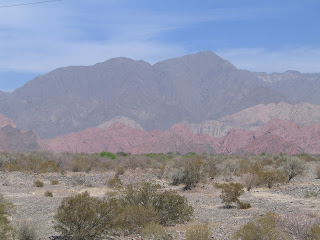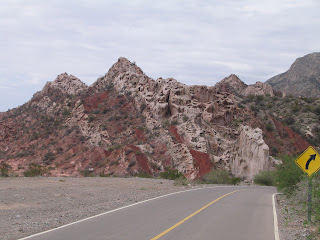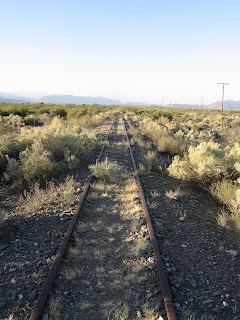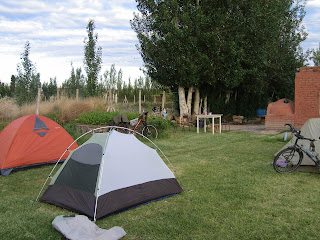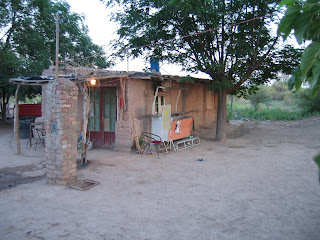When I first sat down with Herbert to drink mate, I
asked him about the history of his finca. He responded sharply. Did I really
want to know? Did I really understand Spanish? If so, he would take the time to
explain slowly. If not, we could drink mate and I could be on my way the next
morning.
I decided to stay an extra day even though I didn’t
need the rest. I had rested in Belen for a day with the inhospitality of
suspicious owners. They did not like me. I did not feel welcomed.
With Herbert, there was an underlying uneasiness,
mistrust, and anger, but it did not sublimate into pettiness. I didn’t get the
sense he wanted to rob, fool, trick, or otherwise harm me. In Belen and in Santa Maria I was on
constant edge about my being ripped off or fooled or robbed. I had reason to
worry. Many Indians had never connected to outsiders because outsiders had
never tried to connect to the Indians on their own terms. Families do not want
to share the intimacy of their daily routines, only to be pitied or
misunderstood and then left the next day. So in suspicion and malice a poison
forms and this venom covers words and action.
There was a distance yet not a venom with Herbert.
Ana was reserved as any woman might be around a strange man and with three
children. Herbert gave me the details of his life. He was born in Cordoba and was an
Indian. He did not have a formal education past 12. His mother had a family
home in Cordoba
and his father the finca in San Blas. He worked many jobs until the age of 17
and then served two years in the military at the time of the conflict in the
Islas Malvinas. He began to cut hair. He would travel around Argentina and
when broke he would go door to door and cut hair to earn money. He showed great
talent, and in Cordoba
the stars and the artists and the rich came to salon. He had enough money to go
to Europe and lived in Germany
for a year and Spain
for a year and he cut hair to make a living. He returned to Cordoba. His success and money continued and
he lived a life of wine, women, and song in a large city but was left
unsatisfied with the emptiness of its materialism. Materialism drives the
matrix, but its fuel--the souls, the families, the lives of men and women--are
left in ashes no matter how rich and satisfying the theme song, the sticky
sweet sauce which deafens and suffocates the sensibilities of the heart and
clear mind and natural soul. In the city men could do nothing with their hands.
They could not build homes or fish or raise chickens and ducks and they could
not teach their children to walk on stilts, swim, play marbles, and make useful
things with their hands. They had become soft and dependent on money and the
comforts and premade fabrications of the city.
And so Herbert returned to his father’s finca,
leaving behind the money and fast life of Cordoba.
One day when he was at the market in San Blas he encountered a beautiful woman
sixteen years his junior. There was an immediate connection. She was the woman
he had been yearning for—a good heart, a good temperament, a woman who had not
been corrupted by the city and could care for a family. At first her father was
furious at the prospect of their being together and wanted to kill Herbert.
Eventually the relationship with Ana’s father cooled and Herbert and Ana were
together. They would move to the finca together with their first born Marcos,
and Herbert would build a home, a lake, a soccer field, and workshop, a nature
center, chicken coop, and an outdoor barber shop. He created a foundation for
the Indian youth to teach them the old ways: the construction of artisanal
crafts, fishing, sports, herbs and edible plants. Signs about the finca read:
“abre to mente,” open your mind. He continued to cut hair but this time it
wasn’t for stars or the rich of Cordoba.
Now the locals would drop by unannounced for a hair cut, some on horse, some by
truck, some by moto. Some youth would come to his finca to learn of the old
ways but there was a limit to what was possible. When I arrived he was
frustrated with the failure of the government to deliver on its promises to
help to develop the foundation. The government apparently had money
but the officials never seemed to do anything for the foundation. After five
years his bitterness was apparent. And the foreigners continued to come and go
on bicycle and motorcycle to camp at his finca but none stayed more than a
night and none were genuinely interested in his family or his history or the
village or the foundation.
Ana brought us fried masa for a snack with our mate
in the late afternoon. We drank the mate with large heaping tablespoons and
soon a client came and Marcos sat with me and I explained my journey to the
eight year old and showed him my maps. Both of us defended the plate of fried
masa from cinco, the 6-month-old dog who would risk his life and certainly a
beating to steal food from humans. I brought the fried dough and mate to
Herbert and Daniel, a client, and we drank and ate in the shade. Daniel was the
local dentist, a native of the city who studied dentistry in Cordoba. He lived close to town with his wife
and two daughters and had a finca 12 kilometers outside town which on several
occasions he hinted would be a good purchase.
Later in the evening we played marbles with Marcos
and walked upstream and drank water from the river. We returned to a dinner of
pizza with duck eggs, olives, and tomatoes served with an ensalata of fresh
tomatoes and onions. I slept well yet and was awoken at 5:30 the next morning
by a large confederation of chickens, ducks, and dogs. I read in my tent until the late morning and
then set off to buy potatoes and apples for the family and yoghurt treats for
Marcos and Mateo. I accompanied Marcos and Herbert to a river to swim. Later in
the day Daniel and his two daughters would arrive to fish. I would again guard
the table from cinco but lose the battle this time as I attempted to entertain
Mateo, who insisted on playing soccer. Later in the evening all of us would take
to the soccer field to pass frisbees, walk on stilts, play soccer, throw
boomerangs, and battle Ana and Herbert in ping pong. At the end of the night we
ate leftover milanesa and pizza. In the morning as I departed Herbert gave me
the telephone number of a local government official. He asked me to call the
man and explain to him the importance of the foundation and how it was an oasis
for the indigenous youth of San Blas. I believe I must improve my Spanish in
order to speak to the official, but when my abilities prove worthy I will call
the official.




































